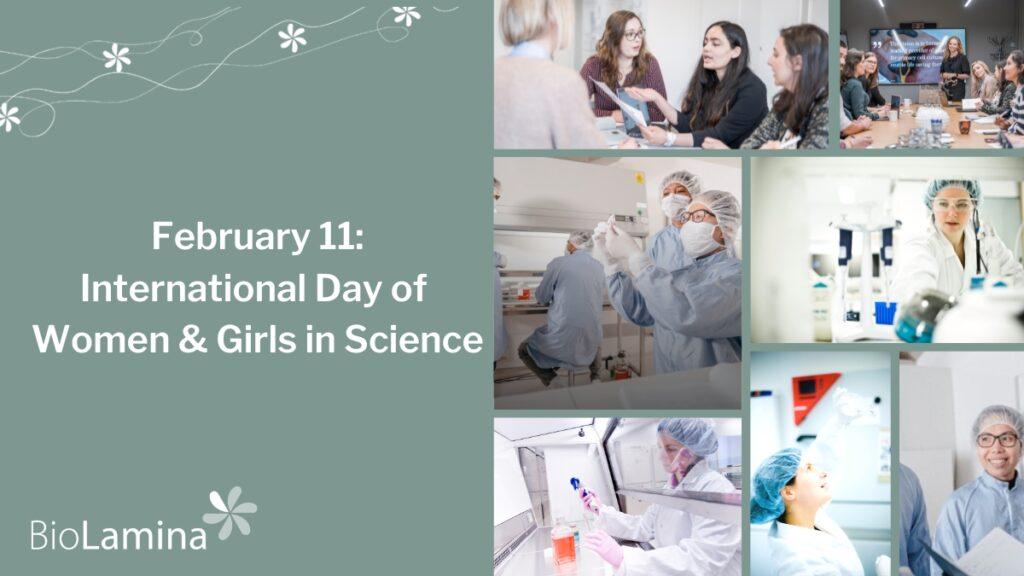BioLamina celebrates the International Day of Women and Girls in Science

February 11 is the International Day of Women and Girls in Science and the opportunity to promote women’s full and equal access and participation to science and technology.
At BioLamina, more than 50% of our team members are women. Among them, many brilliant scientists work with determination to revolutionize cell culture.
We sat with 3 of them and asked them to share with us their passion and inspiring journey.

Why did you choose a career in natural science?
Theresa Mader: I guess I always had a curious character and was interested in nature from an early age. It started with a fascination for plants (which are still a great hobby of mine) and observation of animals, from the smallest beetle to large birds in the garden. Later came the constant “Why does this work like that” questions and the admiration for the complexity of the human body. My curiosity was not stilled by a medical degree, I rather wanted to know how it all worked together, so I choose to study biology instead.
Malin Kele: I was driven by curiosity! I wanted to have the chance of working with talented colleagues from around the world.
Mona Moradi Barzadd: I have always been very curious and like to ask questions and understand and solve problems. The saying “sky is the limit” doesn’t apply to scientists. I would say there is no limit in science! One can come up with a hypothesis and you can investigate and test your theory. What is very exciting for a scientist is that even if the outcome isn’t what you hoped for, still the result will increase our knowledge and maybe can help another scientist to make a breakthrough and cure a rare disease. So, your work and contribution are always important and will be used for generations to come.
What drove you to work with (stem) cells?
Theresa Mader: I was drawn to the stem cell field from the curiosity angle, where does it all begin? Moreover, it was a relatively new field. It opened so many possibilities for treatments against a variety of diseases. I wanted to understand more about immense complexity of stem cells, their genetic regulation, and their great potential for therapy.
Malin Kele: I was drawn to this field by realizing the endless possibilities of understanding disease etiology, and of new generations of drugs and cures.
Mona Moradi Barzadd: I have not worked with stem cells but my PhD was about cell line engineering. I have worked with different human and animal cell lines, and a few cancer cell lines. Cells are the smallest and yet one of the most complex units of the human body. They store the genetic information that makes us unique and the most complex being in the world. Genetic mutations weather inherent or not cause changes in different cellular mechanism and therefore are the cause behind every known disease. We need to increase our knowledge about our cells which in turn will help us to either prevent diseases or to find new and better treatments. This is what make this field so exciting and what motivated me to become a scientist. I truly hope that my work will contribute to this field and make new treatments and cures possible for all individuals regardless of their social and economic background.
Is there gender equality in your field? How do you see it change in the future?
Theresa Mader: During the different stages in my career, I got different views on gender equality. Most of my classmates at university studying biology were female, but the Professors who taught us were mostly male. This changed over the course of the last 15 years. I saw a much greater diversity at Karolinska Institutet. However, still many women struggle in an academic setting to combine family and academic career. This ultimately led to the consequence of missing role models, missing senior colleagues to identify with and missing mentor figures to talk about the future career steps. Now, at BioLamina, the majority of my colleagues are women, and it joys me to see so many women present around me to learn from and aspire to.
Malin Kele: I agree. The gender equality in medical science is improving but there is still a long way to go for equal opportunities.
Mona Moradi Barzadd: No there is no gender equality in our field and less than 30% of researchers are female scientists. But I see a positive trend. There are more and more young women that pursue natural science. They are very ambitious and have a bright future.
Do you have any advice for a young girl wanting to pursue a career in science?
Theresa Mader: Always ask: Why? Follow your curiosity and your thirst for answers! Find your happiness in understanding the wonderous nature around us, in academia or industry.
Malin Kele: Choose a good lab to start your career in and a good mentor. Sound science is many times more important than the project at hand.
Mona Moradi Barzadd: Science is both exciting and challenging. You will face many failures, but like everything else in life, you need to believe in your potential and stand up and continue pursuing your goals. And when everything feels impossible, just think about that your contribution to science will save life and make the world a better place. And that is all the reward you need.
To know more about the International Day of Women and Girls in Science, please visit: www.womeninscienceday.org